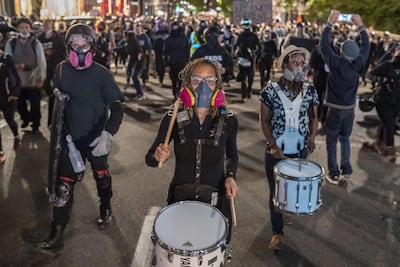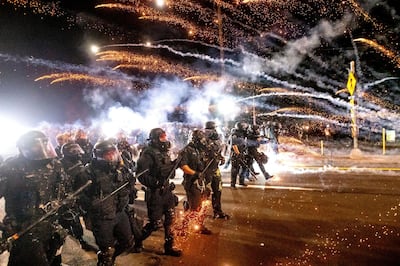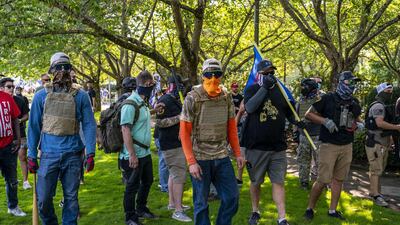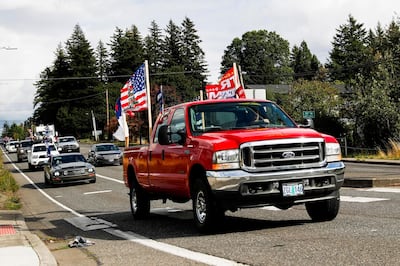In 2018, before Covid-19 killed more than 200,000 people in the United States, before fighting in Kenosha and looting in Manhattan, there was talk of civil war, something that had not been uttered for 150 years.
It started with a Stanford University historian, Victor Davis Hanson, who posed a provocative question in a National Review essay: "How, when, and why has the United States now arrived at the brink of a veritable civil war?"
Mr Hanson’s argument was that nearly every American institution from late-night television to the Oscars to NFL football had become not only polarised but weaponised. Donald Trump’s 2016 election, he wrote, was not so much “a catalyst for the divide as a manifestation and amplification of the existing schism”.
Flash forward one year. Joseph diGenova, a political commentator and Trump ally, tells Fox News: “We are in a civil war. The suggestion that there’s ever going to be civil discourse in this country for the foreseeable future is over. It’s going to be total war.”
Even sensible commentators chimed in. Nicolle Wallace, a former Republican White House communications director who became a fierce Trump critic, agreed with Mr diGenova. But Ms Wallace blamed Mr Trump for the coming war. She said he had “greenlighted a war in this country around race”.

Then came the deaths of Breonna Taylor and George Floyd, urban street violence from Portland and Soho, all highlighting expanding inequality. Those who were already disadvantaged in Mr Trump’s America were made more so by the pandemic. In the midst of this anger is a vast political divide not seen since the 1860s when the Union North and the Confederate South went to war.
Today, a few tense weeks from the election – both sides are engaged in brutal campaigns. The country is plagued by economic disparity, nationalism, extremist groups on both sides, a dire economy and the shadow of Covid-19.
That is without the fires raging in Oregon and the West Coast, hurricanes in the Gulf states and a president who seems to have lost any sense of reality in his quest to remain in power.
Earlier this month Mr Trump visited the National Archives in Washington and vowed to defend history from the Left. He called for “patriotic education” to defend Americans. I kept thinking of May 1933, when Joseph Goebbels stood in Opera Square in Berlin burning 25,000 books alongside jeering right-wing students.
Perhaps my image is extreme. But my career as a reporter of war has trained me to observe indicators and early warnings when stress is breaking out. The first thing I note is the level of nationalistic rhetoric.

War erupted one month after Bosnia and Herzegovina declared its independence in March 1992, aided by extreme propaganda and nationalistic speeches. That was pre-Twitter, but the message echoed by extreme politicians resonated. It resulted in a bloodbath between neighbours in which hundreds of thousands of people died.
I witnessed that war, as well as the Rwandan genocide in 1994. Both left me with a fear of the word “nationalism”. To me, it is not synonymous with patriotism – the pride in one’s country. It is a call to divide and polarise a population. In President Trump’s case, his numerous tweets are a dangerous trigger for conflict.
My editors would always dispatch me to referendums or elections in unstable countries, foreseeing violence or upheaval. There are those who believe that the November elections in an unstable America will spark civil strife. This will be aided by the number of guns in this country, sales of which went up at the beginning of the pandemic.
What most informed people I speak with believe is that either Mr Trump loses and refuses to go; or he wins (or steals the vote) and there will be violent street protests involving movements like Antifa or Black Lives Matter.
This might be an exaggeration. But it is doubtful Mr Trump can remain in office without anger. It might not be civil war but it will be civil discord, perhaps on the scale we saw during the “Long Hot Summer” of 1967 when cities like Newark and Detroit burnt after intense rioting. Those cities sparked many more across the country – New York, Chicago, Minneapolis, Birmingham and Rochester.
The cause of the ’67 riots was abusive policing, poor housing, institutionalised unemployment and racism. There was an angry sense that our politicians were not working for the good of the people in the street.
We have not learnt much since then, although after the Yom Kippur war of 1973 and the Falklands war of 1982 – both unanticipated – political scientists and humanitarians sought to study the ways that wars begin. We try to analyse the signs in an attempt to halt their eruption.
For instance, the greatest tragedy of the Rwandan genocide was that despite President Bill Clinton and others insisting the genocide happened before they could stop it, anyone studying patterns in the months preceding the slaughter knew what was coming.
We can prevent crisis by qualitative analysis: identify the underlying political, social and economic factors creating the conditions for conflict. In the US, it is clear: people are fed up with the enormous gap between rich and poor and what they perceive as an erosion of democratic institutions.
The media has contributed, with both sides unwilling to concede any kind of objective or balanced reporting.
As election day draws nearer, the gap grows wider. When I look at electoral maps of America, I see red states in the middle and the blue states on either coast, even though many states such as Florida or Pennsylvania have deep internal divisions.
But will this result in war? Civil war comes when there is a willingness on the part of masses of people to engage in violence against their political enemies. I worry about militias, but I trust most Americans do not want war with neighbours.
A course I teach at Yale looks at four conflicts from the 1990s: Bosnia, Rwanda, Sierra Leone and Kosovo – and seeks to identify patterns so that we can compare them to current conflicts.
More than 600,000 men died in the American civil war, the greatest toll of any war in American history. The cause was race, trade and a country deeply divided. The Spanish philosopher George Santayana famously wrote in The Life of Reason in 1905: "Those who cannot remember the past are condemned to repeat it." And that was before the disastrous wars of the 20th century.
It would serve President Trump – and also his counterparts – well to remember that healing a country is far more important than cleaving it in two.
Janine di Giovanni is a Senior Fellow at Yale University's Jackson Institute and the author of, most recently, The Morning They Came for Us: Dispatches from Syria. @janinedigi



